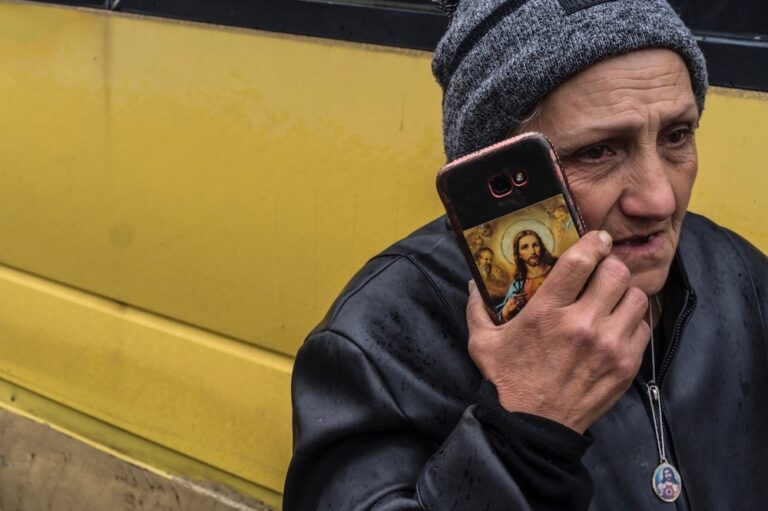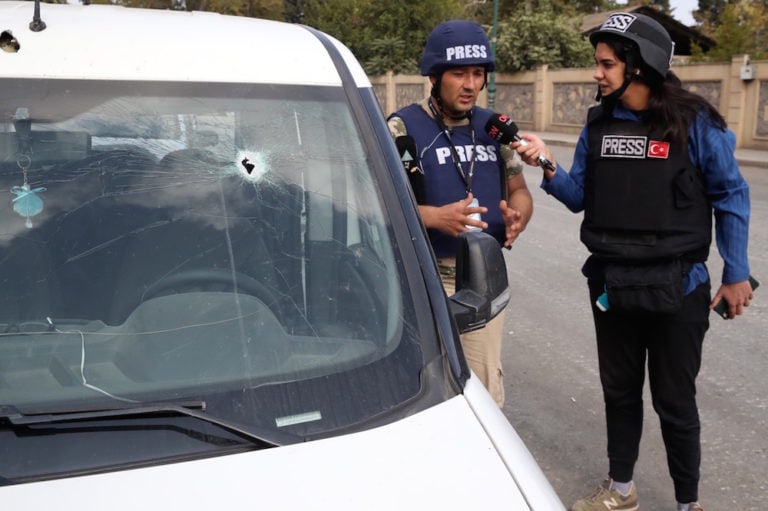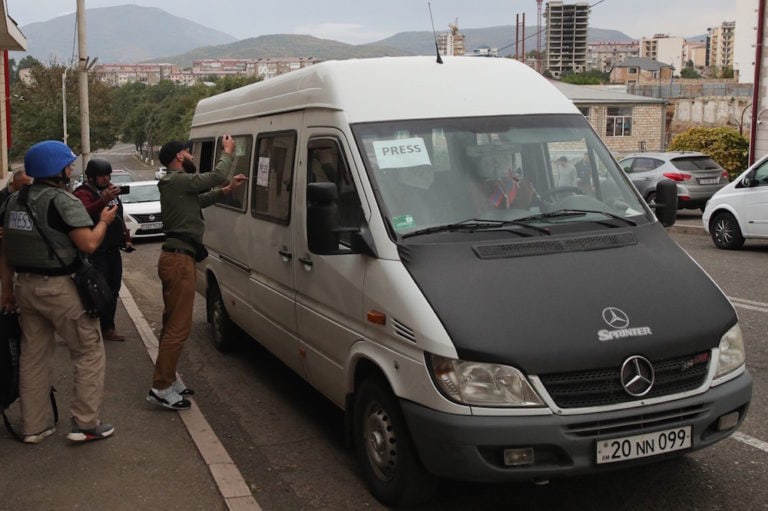(HRW/IFEX) – The following is an abridged Human Rights Watch press release: Armenia: Violence at Polling Stations Mars Elections Assailants Target Opposition Activists, Observers and Journalists (New York, February 22, 2008) – The Armenian government should investigate alleged assaults on election observers and journalists that marred the presidential election on February 19, 2008, Human Rights […]
(HRW/IFEX) – The following is an abridged Human Rights Watch press release:
Armenia: Violence at Polling Stations Mars Elections
Assailants Target Opposition Activists, Observers and Journalists
(New York, February 22, 2008) – The Armenian government should investigate alleged assaults on election observers and journalists that marred the presidential election on February 19, 2008, Human Rights Watch said today. According to victim testimonies taken by Human Rights Watch, assailants beat and threatened opposition party activists, domestic observers, and journalists who attempted to document election fraud at polling stations during the presidential vote.
“These election-day attacks targeted the very people trying to ensure the integrity of Armenia’s vote,” said Holly Cartner, Europe and Central Asia director at Human Rights Watch. “The Armenian government should carry out independent and speedy investigations to ensure justice is served and to send the message that intimidation won’t be tolerated.”
On February 20, the Central Election Commission declared Prime Minister Serzh Sargsian the winner of the elections with 52.8 percent of the vote. Sargsian had the backing of current president Robert Kocharian. Armenia’s first president Levon Ter-Petrosian was the main opposition challenger and won 21.5 percent, according to official tallies.
In nine cases documented by Human Rights Watch, assailants intimidated, threatened, and even violently attacked opposition party activists, domestic observers and journalists at eight polling stations in and around the capital, Yerevan. Victims variously described their assailants as “big guys,” “athletic,” “tough,” and apparently supporters of Sargsian. Most victims had been attempting to expose what they believed to be violations of electoral rules, such as incorrect voters’ lists, intimidation of voters, violations of the right to a secret ballot, and ballot-box stuffing. None of the victims was able or willing to return to the polling station to continue observing the voting.
In several incidents, the assaults took place in the presence of police and polling station officials who did not intervene, and in one case a police officer appeared to assist the assailants. Some victims reported the attacks to police, who are investigating.
Human Rights Watch called on the Organization for Security and Cooperation in Europe (OSCE) to look into election-related violence and ensure that its final report on the vote records these incidents.
(. . .)
At least three journalists were attacked. Lusine Barsegian of the newspaper Haikakan Zhamankak was beaten and had her camera and voice recorder stolen when she attempted to document what she believed to be intimidation of voters at a polling station in Yerevan’s Erebuni district. A cameraman from the independent A1+ television station was beaten and had his camera taken at the same polling station. Two domestic election observers, Armen Matirosian, a member of parliament from the opposition Heritage party, and Zarui Postandjian, an observer from a nongovernmental organization, were also attacked at this polling station after they tried to raise alleged election violations with polling station officials.
The OSCE election monitors stated that the elections were held “mostly in line” with international commitments.
Tens of thousands of Ter-Petrosian supporters took to the streets in downtown Yerevan on February 20 and 21 to protest the outcome of the elections and what they believe to be widespread electoral fraud.
“The Armenian authorities should ensure that no harm is done to peaceful demonstrators,” said Cartner. “Armenia claims to be a democratic country, and that means allowing people to exercise their right to freedom of assembly.”
(. . .)
Details of Assaults
Yerevan
Polling station 13/16
Lusine Barsegian, a journalist for Haikakan Zhamankak told Human Rights Watch she went to polling station 13/16 in the Erebuni district of Yerevan at approximately 2 p.m. on February 19. When she arrived, she saw that the polling station was very overcrowded. Some unidentified people were talking to voters in what she believed to be an attempt to influence their votes, and other people were observing the voters closely as they cast their ballots. Barsegian attempted to interview the central election commission representative responsible for the polling station about the apparent violations. At that point, policemen and a few unidentified men forced her out of the polling station. Barsegian protested, saying, “I have the right to be here. I have the right to take photographs.”
With the assistance of Armen Matirosian, a member of parliament from the Heritage party, who was an authorized election observer, Barsegian again entered to the polling station. When she again attempted to take photographs, an unidentified man in plainclothes kicked her in the stomach and grabbed her camera and voice recorder. Other men also punched and kicked Matirosian. According to Barsegian, police stood by and did not intervene. After this attack, Barsegian and Matirosian fled the station and filed a complaint with the prosecutor’s office.
When Zarui Postandjian, an observer from the nongovernmental organization Against State Violence, heard about the incident, she went to polling station 13/16. Upon arriving, she saw a severely overcrowded polling station and police and unidentified people observing voters as they marked their ballots. Postandjian has stated that she tried to take photos of the polling station when a policeman came up from behind her and hit her. At the same time, an unidentified man tried to grab her camera, and both he and the policeman punched her. Another observer came to assist her, and they both fled. Postandjian did not return to the polling station. Postandjian filed a complaint with the prosecutor’s office, which opened a criminal investigation.
(. . .)
Kentron district
Hovsep Hovsepian, a cameraman with the independent A1+ television station heard about election violations at polling station 9/6 in the Kentron district of Yerevan. Hovsepian told Human Rights Watch that when he got out of his car at the polling station, a large group of unidentified men who had gathered outside the polling station attacked him and attempted to take his camera. When Hovsepian resisted, one of the men kicked him in the stomach and grabbed the camera. The assailants took the video cassette out of the camera, smashed it, and prepared to destroy the camera as well. At that moment, the driver of the car came out and the men began to attack him instead. Hovsepian and the driver broke free of the attackers, returned to the car and left the polling station.
(. . .)
To read the full release, see: http://www.hrw.org/english/docs/2008/02/21/armeni18128.htm
For more of Human Rights Watch’s work on Armenia, please visit: http://www.hrw.org/doc?t=europe&c=armeni


